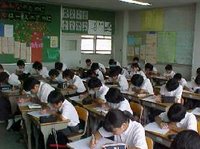

Hi, this is my first attempt of our class project (only three girls, though). My name is Kano; I am a student of Kitasato University.
[Note: You can read more about our university in another article below.]
Actually, we had to DO something for this assignment long before. But we have not done anything until today. We knew that we should have done something, but we have being just waiting teachers information. I know this is the typical Japanese students style of learning. I hate it, but I am.
I call it Passive Learning. Since elementary school, it has been started in Japan. In the class, teachers don't ask us WHY or What DO YOU THINK? but WHAT IS THE ANSWER? So we only need to just answer the question with a few words. By test, this is the same. There is almost only one correct answer for one question. It means the students are not asked to tell their own opinion.The situation doesn't change even in high school.
 Once in a long while,the teacher asks us what we think, but we can't answer. It's too late at the time. We don't know any longer how to tell or discribe what we think or how we feel.
Once in a long while,the teacher asks us what we think, but we can't answer. It's too late at the time. We don't know any longer how to tell or discribe what we think or how we feel.Now I know why Japanese people cant speak foreign languages well. There are many reasons for it, but it's sure that this learning style affects [confidence to learn] at least. Because we have never had write our own view in English test (even in Japanese), it is not wonder hy can we talk in English to tell our opinions or feelings?
During my high school time, I was an exchange student to Germany for a year (Does anybody know AFS?). I had enjoyed it there and learned lots from the experience and enjoyed life there. So now ,what I want to say is the big different point between Japan and Germany (not only Germany but other developed countries) . This difference I felt is the style of schooling.
In the classes in Germany, the teachers always ask students WHY and the students raise their hands higher than others. I've never seen this scene in Japanese schools. The test is also different. For example, the theme of English test is often WHAT DO YOU THINK ABOUT ・・・ ?
So these are some reasons why I call the Japanese students' style of learning -- Passive Learning. I dont want to blame the Japanese School for al because if I think is wrong way to learn, I can try to change it. But I don't. And I know that this theory could never be the reason why I haven't done our assignment until today. I was just lazy. Sorry.
Thank you for reading my report with weak English. (←because of school.hehehe) I hope you can understand...
EDITOR'S NOTE [ Kano has done a good job of giving the readers some insight into what some of the important differences between the styles of education and what schools in Japan and Germany expect from their students. I appreciate her humor and her candor. I think we all learn things that are both good and not-so-good about our own culture when we live (and learn or work) in another country, as Kano has done. It was great hearing her insights. db ]





